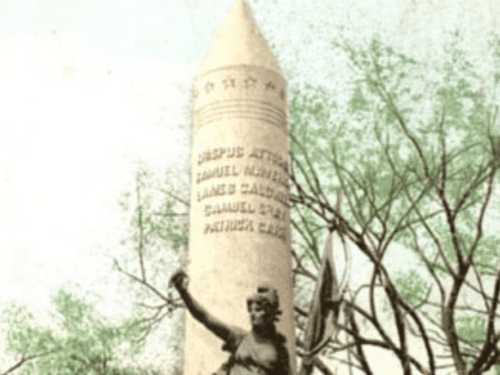
Patriot or Fool? Crispus Attucks and the Civil Rights Movement

Written by Megan Woods, MA in Public History student at Northeastern University
The Legacy of Crispus Attucks – Part III
This post is part of a series exploring the legacy of Crispus Attucks, the first victim of the Boston Massacre. These posts were written by students in the Master of Public History program at Northeastern University. Crispus Attucks was an enslaved man of African and Native American heritage about whom little is known, but his legacy has been important to successive generations of Americans. For more information about the life and legacy of Crispus Attucks, see First Martyr of Liberty: Crispus Attucks in American Memory by Mitch Kachun (Oxford University Press, 2017).
As civil rights leaders argued for basic freedoms for African Americans as American citizens, Crispus Attucks became a symbol of the continuous contribution of blacks to the nation. Many viewed his actions on that fateful day in March 1770 as a demonstration of the deep patriotism of blacks since the founding of this country, patriotism that African Americans still celebrate many years later. Numerous civil rights leaders and organizations referred to Attucks in their speeches and written work, from Jackie Robinson and Jesse Jackson to the Student Nonviolent Coordinating Committee. Even though most leaders viewed Crispus Attucks as a hero for the African American community, a few did not. Martin Luther King Jr. and Stokely Carmichael represent these opposing views during the passionate era of the 1960s, with the former praising Attucks as a hero and the latter calling him a traitor to his race.
To Martin Luther King Jr., Crispus Attucks embodied what it meant to be an African American in the United States. In the introduction to his book Why We Can’t Wait (1964), King describes a young African American girl and boy who knew that whites had excluded the stories of African Americans from history textbooks, like that of “the first American to shed blood in the revolution… named Crispus Attucks” (King, ix). This same girl and boy, King argues, also knew “a great-great-grandson of Crispus Attucks might be ruled out of some restricted, all-white restaurant in some restricted, all-white section of a southern town, his United States Marines uniform notwithstanding” (King, ix-x). Through these children, Martin Luther King not only demonstrates the missing presence of African American stories in the U.S. education system, but he also addresses the need for social change. African Americans have contributed to the making of America; therefore, they should be recognized by their fellow citizens for their sacrifices to the country. Martin Luther King argues that recognizing the heroism of Crispus Attucks provides a foundation to acknowledging the patriotism of all African Americans.
On the other hand, Stokely Carmichael of the Black Power movement viewed Crispus Attucks very differently. While Martin Luther King preached for change through nonviolence, the Black Power movement eventually saw nonviolence as ineffective in promoting change. Many Black Power proponents had been activists in the Student Nonviolent Coordinating Committee. Carmichael believed African Americans should follow in Attucks’s example of starting a “rebellion.” But this was the extent to which Carmichael saw Attucks in a positive light. Instead, Carmichael criticized the idolization of Attucks since he embodied the notion that blacks should put their American identity before their black identity. In a 1967 speech to Garfield High School in Seattle, Carmichael called Crispus Attucks a “fool” since he “died for white folk country while the rest of his black brothers were enslaved in this country. He should’ve been fighting white folk instead of dying for white folk!” In the end, Carmichael believed Attucks was another example of an African American who sacrificed himself for the very people who treated him unjustly.
Crispus Attucks’s legacy is widely interpreted within and between generations, and his memory has been molded to fit contemporary needs. During the civil rights era, Martin Luther King Jr. and Stokely Carmichael held very different views of Attucks. Despite these opposing positions, most civil rights leaders embraced Crispus Attucks’s legacy to argue for equal rights for African Americans, who they argued have been contributing to this country since its founding.
Works Cited
King, Martin Luther. Why We Can’t Wait. New York: Signet Classics, 2000.
Carmichael, Stokely. “Speech given at Garfield High School, Seattle, Washington, April 19, 1967.” African American Involvement in the Vietnam War.B

